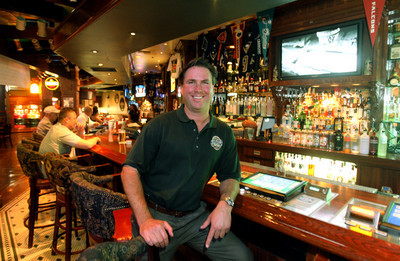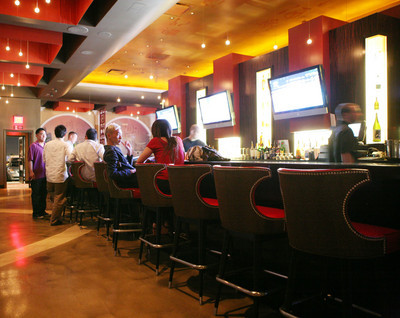With butts out, bars lowered


Southern Nevada’s weakening economic conditions, coupled with a voter-enacted statewide ban on smoking inside businesses where food is served, has cast a pall over the once-booming tavern industry.
New taverns aren’t being built as fast as in previous years, said an official with the Nevada Taverns Owners Association, a trade group that represents the industry.
Meanwhile, revenue has dropped at many taverns — as much as 30 percent in some locations — because of a decline in customers and a decrease in the amount loyal patrons are spending.
Most blame the lost business on the smoking ban, which took effect in January. The prohibition against smoking sent gamblers who want to light up while playing slot machines to either a traditional casino or one of the handful of taverns built before 1992 that have 35 slot machines and are thus exempt from the smoking ban because the businesses were classified as casinos.
“There are a lot more challenges for an operator than ever before,” said Joseph Wilcock, the president and chairman of the tavern owners’ association. Wilcock owns The Brewery on East Sunset Road.
“The construction of new taverns slowed because some people want to redesign their plans in order to comply with the smoking ban,” Wilcock said. “But at the same time, the banks are jittery. They want to see the financial projects before they issue construction loans.”
Wilcock estimates that 75 of the tavern association’s roughly 300 members gave up food service to keep their gambling and smoking patrons. Most of the membership, he said, is complying with the smoking ban “but are losing their shirts.”
None, Wilcock said, wanted to give up the moneymaking slot machines.
During Southern Nevada’s economic boom times, taverns provided a lucrative business mode: a restaurant with reasonably priced food, a bar and 15 slot machines, most often owned by a slot machine route operator who serviced the games and paid out jackpots. Contracts differ, but for the most part, route operators split the slot machine revenues with the tavern owner, paying a fee to lease the space.
Tavern owners said gamblers often preferred the tavern experience to a locals casino, likening the atmosphere to the slogan from the NBC television series “Cheers,” which was set in a Boston-area bar that customers frequented because “Everybody knows your name.”
Roger Sachs, co-owner and operations director for the three Las Vegas-area Steiner’s taverns, said friendly service, good food and a lively atmosphere help keep customers from taking their business to a more traditional restaurant.
“Since we opened our store three years ago (on Las Vegas Boulevard South near Windmill Lane), about 15 traditional restaurants opened up around us. We lost some business, but it quickly came back.”
Sachs said the gambling devices made Steiner’s three locations profitable. He wouldn’t release numbers, but he estimated that each of the Steiner’s locations ranked in the top 10 percent in the county among tavern operations for gaming revenues before the smoking ban.
Since January, however, revenues from the slot machines are off 29 percent to 35 percent at each location.
“We probably do as well on food as anybody because that’s something we wanted to establish,” Sachs said. “But other places might take a monthly loss of $10,000 on food, but made it up with the gaming. That’s not the case now because the business is not there.”
Taverns are classified by the Gaming Control Board as restricted gaming licensees, along with convenience stores, laundries and other places with 15 slot machines or fewer.
Restricted gaming license holders don’t pay the state a percentage tax on their gambling revenues (the major casinos pay the state 6.75 percent on all gaming revenues.) Instead, restricted license holders pay an annual fee of $250 per slot machine, plus $20 per machine each quarter.
Gaming Control Board member Mark Clayton said the agency doesn’t audit the gaming revenues from restricted licensees because they don’t pay percentage taxes.
Still, an insight into how tavern owners have seen their profits drop comes from Herbst Gaming, Nevada’s largest slot route operator with approximately 7,200 slot machines in 700 locations throughout the state. The company has public debt and Herbst is the only route operator that publicly reports its earnings.
In the recently completed third quarter, Herbst said revenues from the company’s route operations were $66.1 million in the three months ended Sept. 30, a 21 percent drop over the same period in 2006. For the first nine months of 2007, Herbst’s slot route operations generated $212.5 million, 19 percent less than the same nine-month period in 2006.
“There is no question the smoking ban had a dramatic impact on our route operations and has fundamentally changed the slot route industry,” Herbst Gaming President Ed Herbst told gaming analysts following the earnings release.
United Coin Machine, which operates about 6,000 machines in more than 400 locations statewide, is experiencing similar losses in revenue. United Coin President Grant Lincoln said the smoking ban created an uneven playing field for the tavern operators, who don’t have the promotional budgets to match the customer incentives offered by the large casinos.
Like Herbst, United Coin is assessing how much of a financial effect the tavern industry will endure.
“There’s not a lot we can do,” Lincoln said. “As their volume suffers, our volume suffers. The question is, have we truly bottomed out? The smoking issue has been a fairly crushing blow for the average tavern operator.”
Lincoln said there are other economic issues facing tavern operators. Gasoline prices are climbing above $3 a gallon, which cuts into consumer spending, he said.
Sachs said Steiner’s bottom line first saw a change in customer spending habits when the real estate market softened. Housing speculators, who bought and resold homes in the vibrant environment, lost much of their disposable income and stopped spending as much on entertainment.
As the smoking ban took hold, tavern operators without a niche market suffered.
“I would say there has been an oversaturation in the market,” Sachs said. “With the economy right now, expansion has slowed.”
Sachs said Steiner’s is sitting on a potential fourth location, near Rainbow Boulevard and the Las Vegas Beltway in the southwestern Las Vegas Valley, but he’s waiting to see how the tavern association’s lawsuit challenging the smoking issue plays out in the Nevada Supreme Court.
For now, Sachs said Steiner’s will spend $75,000 to remodel the interiors at its three locations to separate the bar and restaurant areas with pony walls and glass, thus allowing smokers to frequent the bar and slot machine area once again.
Wilcock said many tavern operators will have trouble remodeling because of the cost. Banks, he said, aren’t as quick with loaning their money.
“I think we’ll start seeing a much different model as new locations open,” Wilcock said. “The new places will be built where smoking is separate from the food.”
This story first appeared in the Business Press. Howard Stutz writes for the Business Press’ sister publication, the Las Vegas Review-Journal. Contract reporter Howard Stutz at hstutz@reviewjournal.com or (702) 477-3871.












